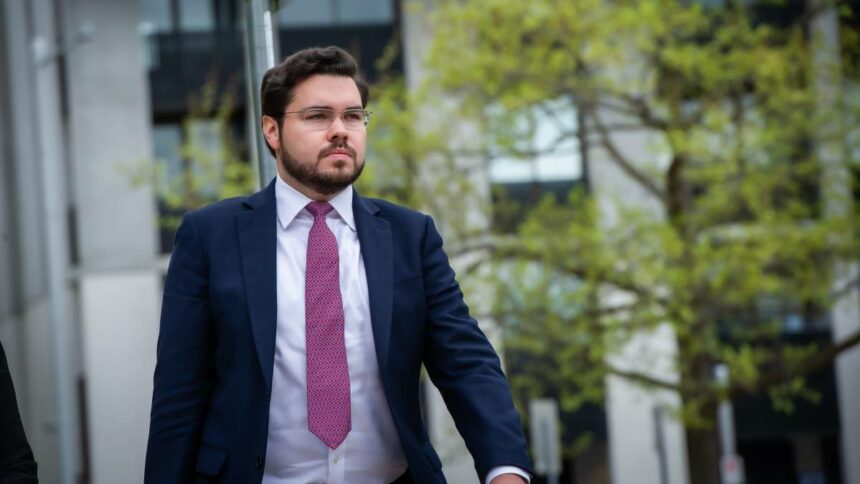After a night out in March 2019, Brittany Higgins was allegedly sexually assaulted on the sofa of a government minister by Bruce Lehrmann, 27.
He claims they had no sexual activity at all.
But after a 12-day trial and five days of discussion, it was discovered that one juror had glanced at scholarly studies on sexual abuse, leading to the jury’s dismissal.
Only the information that has been given in court may be used by juries to determine a case.
Chief Justice Lucy McCallum told a Canberra court that “It may be that no harm has been done, but that is not a risk I can take,”
Judge McCallum believed that she had warned the jury about conducting their own investigation at least 17 times, and “probably much more” times.
A court representative found the academic journal after it fell off a table while “routine tidying” the courtroom.
Ms Higgins waived her right to privacy before disclosing her narrative to authorities in early 2021 and made it public with her allegations in prominent media and television interviews.
Her accusations served as the impetus for what has been dubbed Australia’s “Me Too moment,” which sparked protests and discussions about women’s safety across the country and exposed a toxic work environment in Australian politics.
It was revealed throughout the trial that Ms Higgins and Mr Lehrmann had an office with Linda Reynolds, who was the defence industry minister at the time. They shared beverages with coworkers and others on March 22, 2019.
The jury was informed that Ms Higgins claimed to be the drunkest she had ever been after having to spend hours at two Canberra bars before the duo took a cab to Parliament House.
She was sobbing within the courtroom as the jurors saw video surveillance of her and Mr Lehrmann approaching the structure.
Ms Higgins testified during a police interrogation that was shown to the jury that she had slept off in Minister Reynolds’ office before waking up to find Mr Lehrmann having sex with her.
She admitted to crying to the cops. She said, “I told him no; I told him to stop.
Ms Higgins could not have given permission for intercourse since she was “unconscious,” according to the prosecution.
The jury heard that she initially reported the alleged rape to authorities in the days that followed, but she later withheld filing a formal complaint out of fear of losing her work.
Although Mr Lehrmann declined to testify, he stated that what was described “simply didn’t happen” in an interview with police that was presented to the court.
Parts of Ms Higgins’ testimony, according to his attorney Steven Whybrow, were “completely and absolutely inconsistent.”
He declared, “We can’t be satisfied beyond a reasonable doubt that she knows what happened.”
Ms Higgins arrived in court to see the case’s demise but fled before the judge made her decision.
When they were informed that they were being discharged, a few jury members were very angry.
They informed the court on Tuesday that they had so far been unable to come to a landmark judgment, but the judge promptly ordered them back to continue discussing.
“Everyone is disappointed at what happened but it would be inappropriate and irresponsible to say anything at this stage,” Mr Lehrmann’s attorney briefed press outside the court.
Although the parties have not yet argued if Mr Lehrmann should stand trial again, Justice McCallum set aside a day in February just in case.
On that date, it will have been two years since Ms. Higgins’ alleged rape on national television provoked a larger crisis.
There was widespread rage at what was thought to be the government’s weak response. Her assertion sparked complaints of Australian politics as a harsh workplace, particularly for women, once more.
More than 100,000 people protested in towns and cities around Australia last year to express their outrage at discrimination, bigotry, and violence in society.
Additionally, it sparked a scathing investigation that revealed that a third of federal parliament employees had experienced sexual harassment.
Because of the notoriety, there had been worries that Mr Lehrmann might not receive a fair trial, but an earlier request to have the case dismissed was denied.












